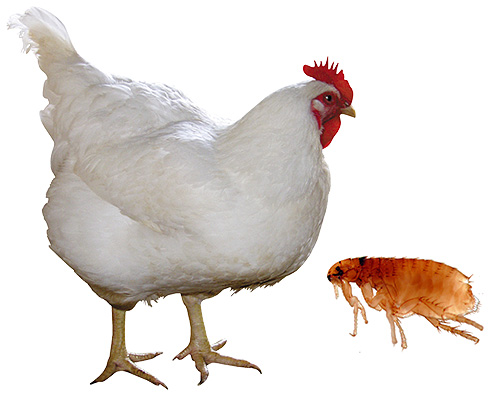
The so-called chicken fleas are widespread bird parasites that parasitize not only on chickens, but also on many other birds. Often they are found even on parrots and canaries, but they cause the main harm to farm birds, where, when breeding in large quantities, they can lead to the death of birds, a decrease in the number of eggs and the spread of dangerous infectious diseases.
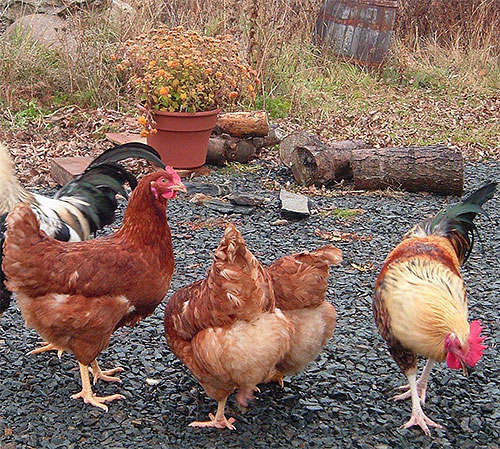
Due to the fact that these parasites have many specific features of biology, getting rid of chicken fleas is somewhat more difficult than from fleas in dogs or cats. Quite specific and treatment of chickens from fleas. Nevertheless, all these procedures have already been worked out quite well for today, and therefore a theoretically trained farmer usually fights with chicken fleas quickly and successfully.
Appearance and features of parasites
A flea chicken looks a little different from other fleas, including a flea of mammals. She has the same dark shiny body about one and a half millimeters long and devoid of wings, also jumping well. Only under a microscope, fleas in chickens are distinguished by the presence of well-marked antennae and developed eyes.
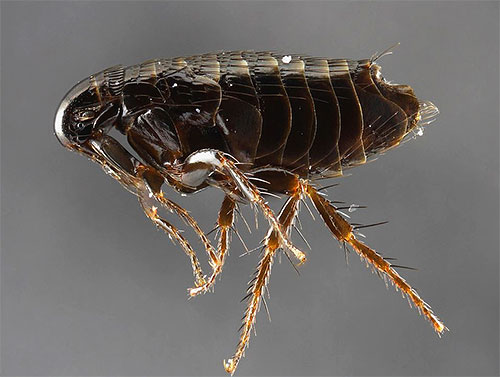
In general, bird fleas have a somewhat taller, hunched body. Because of this, they are somewhat more compressed from the sides, than the already “flat” fleas in cats and dogs, and therefore, even when the parasite is caught by the fingers, it is almost impossible to crush it.
On a note
Strong chitinous cover gives the flea little body additional strength. In most cases, it protects the insect from accidental death under the claws or beak of a bird trying to scratch. In general, in the plumage of birds, fleas are safer than in animal fur, they multiply faster and strike birds more intensively.
Most often, fleas at chickens are caught in the eye when crawling out of the feathers to feed on bare skin near the beak and eyes, as well as on the legs. The same parasites that swarm in the plumage are almost imperceptible and can draw attention to themselves only because they annoy the bird very much and make it behave very restlessly.In the open areas of the bird's body, chicken fleas look like small dark growths, such as human moles, and alone do not attract attention.
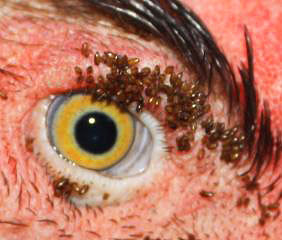
On a note
Chicken fleas are well distinguished from other common poultry ectoparasites - the red bird tick, the ability to jump. In a tick, the body has a pronounced red color (in fleas it is brown), and the paws are set wide apart, so that even with its tiny sizes, they are noticeable well. Treatment for fleas and ticks involves the use of completely different means, and getting rid of some parasites with drugs for others in many cases will not work.
Below are photos of fleas in chickens. Such a number of parasites in a small area of skin is typical for especially neglected cases, in which birds themselves are depleted, often ceasing to be carried:
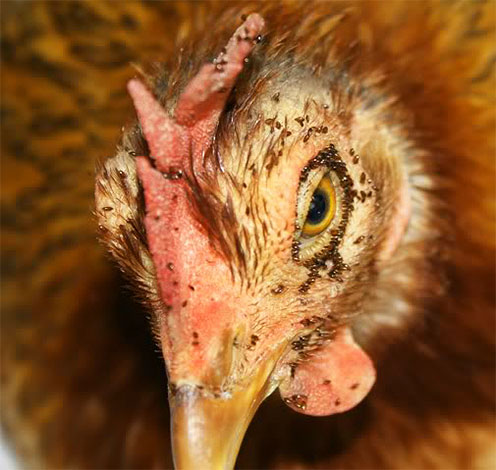
A separate photo shows bird fleas under a microscope - they have a noticeably high body and well-developed hind legs:
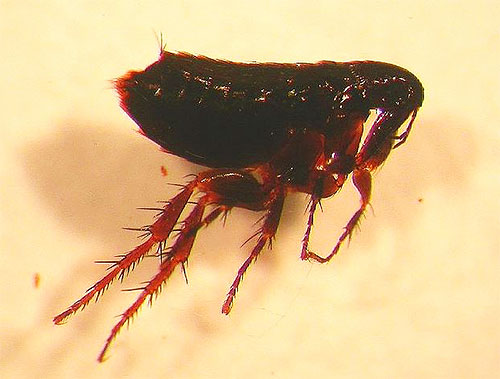
The photo below shows a parrot struck by chicken fleas - the parasites themselves are not visible, but feathers plucked out by the bird are noticeable on the stomach.
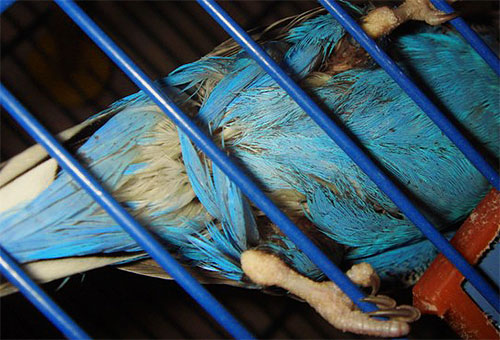
Lifestyle, nutrition and breeding chicken fleas
Chicken fleas differ from fleas in mammals by high requirements for the microclimate in the habitat: the optimum temperature for their life is 40-41 ° C. Such a temperature can only be provided on the body of the birds, under the feathers, and even in the nest under the incubating chicken, the fleas will feel uncomfortable. For this reason, chicken fleas almost never leave the body of a bird.
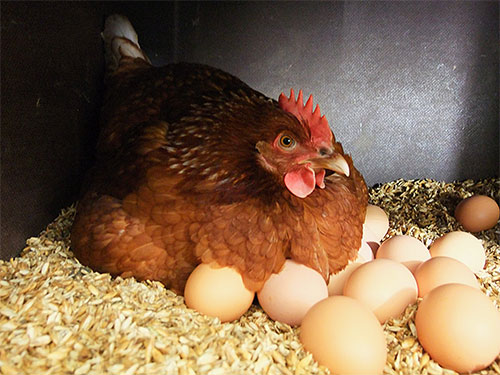
Bird's fleas can bite through only the thin skin of birds. For this reason, it is extremely rare to parasitize these insects in mammals, including humans. In rare cases, fleas in a hen-house can bite a person, but they cannot live and multiply away from birds. Therefore, chicken fleas in the house are usually present only in bird cages.
It is interesting
Even a bird’s flea bite will not allow it to be filled: a person’s blood vessels are generally deeper than those of birds, and the parasite most often unsuitable for such conditions after one bite simply goes to look for another victim. Therefore, chicken fleas on humans do not parasitize and bite him only in extremely rare cases.
Despite such affection for the host, fleas cannot reproduce on the bird's body. The female parasite with a force pushes a portion of eggs from her calf (every day about 3-6 pieces), which fly a long distance and fall to the floor of the chicken coop or to the bird's nest.
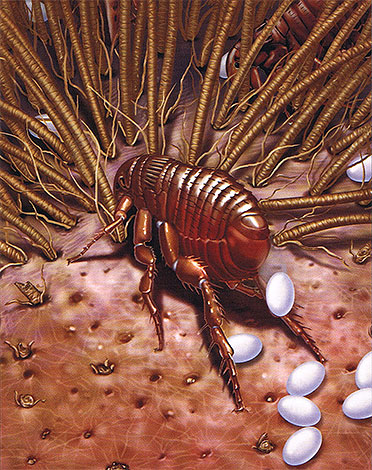
Here, flea eggs hatch larvae, which feed on the dry blood of birds in adult flea excrement, rotting pieces of organic matter and grass, bird droppings, and after a few weeks turn into fixed pupae. At the pupal stage, the insect remains until a bird appears near it for a long time - this usually happens when the pupa is in the old nest, and only after the hatching begins again in the nest, many young and hungry fleas emerge from the litter . Obviously, flea pupae can be dormant for months, while the nest awaits its summer tenants.
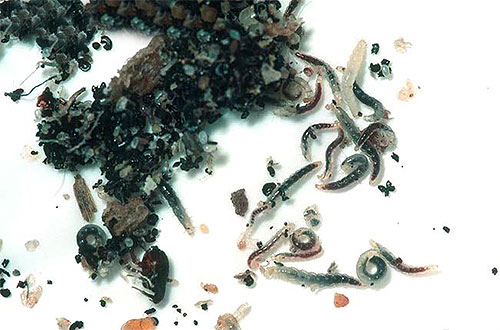
On a note
The life of an adult bird flea is several months, sometimes more than a year. It is no wonder that often fleas “fly” on birds to a new nest and lay eggs here.As a rule, several generations of fleas have time to appear in one nest in one season.
In chicken coops, the situation is especially difficult. If a bird in the natural environment after the chicks leave the nest leaves the place infected with parasites, the chickens in the henhouse do not have such an opportunity. Accordingly, the birds are constantly tormented, and the development and reproduction of fleas proceeds without interruption at an elevated rate. That is why fight fleas in the hen-house should be especially diligent and this struggle should begin immediately after the detection of parasites.
What are dangerous chicken fleas?
Fleas in birds are dangerous in the first place because they constantly irritate the bird, lead to nervous scratching, make it pluck feathers. With a strong infection in chickens, anemia can develop, sometimes they stop eating and die from exhaustion. Therefore, the treatment of flea chickens should begin as soon as the parasites have been detected.
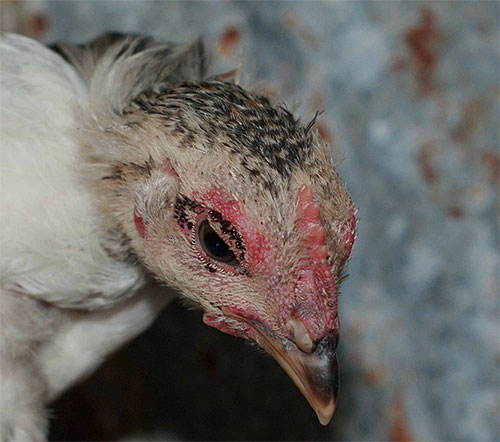
Even more dangerous for birds, and for the person working with him, the ability of fleas to endure serious diseases. First of all, it is brucellosis, salmonellosis, trypanosomiasis, sometimes causative agents of plague and encephalitis were found in chicken fleas. On the homestead chicken coops, the probability of infection of birds with such diseases is especially high, since wild sparrows fly into the enclosures with chickens, pigeons graze near them, from which fleas may well fall into the hen house.
Feedback
“Never before had this happened, and this summer they began to notice fleas in chickens. And the further, the more. Several Belarusian rush ceased, and the Orpingons turned out to have a lot of this infection. One hen quit sitting on eggs, we wondered why, we did not know which treatment to apply. And when we carefully examined the nest, we were simply amazed - it was directly infested with parasites, we had to throw all the eggs (already 28 pieces). Tell me, please, how to get rid of chicken fleas so that it is effective and safe. ”
Ivan Petrovich, Nizhny Novgorod
Birds fleas are dangerous to humans that are potentially able to be carriers of pathogens of many diseases and helminth eggs. The chances of being bitten by a flea with the causative agent of the same encephalitis in the chicken coop are few, but the probability is always there. But worms carry almost all fleas, and regular parasite bites on the body - an excuse to drink away the course of funds from worms.
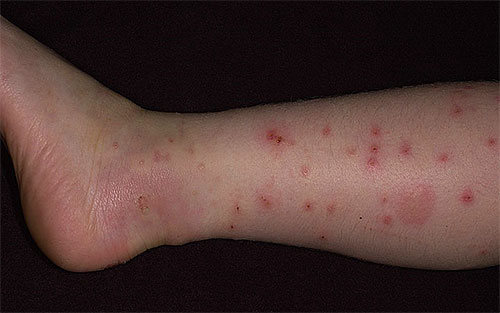
On a note
In general, chickens living on free grazing and having the opportunity to leave the cages, less often seriously infected with fleas and more easily tolerate such parasitosis. On the runs they have the opportunity to clean the plumage in anthills or dust, and in general, often leaving the infected area, they significantly reduce the intensity of flea reproduction in the hen house.
However, if fleas in chickens still start, the birds need to be treated. With parasites - fight, and the chicken coop - carefully cleaned from larvae and pupae of insects.
Means to fight chicken fleas
To bring out fleas in chickens in a small household or decorative birds at home, you can use specialized flea drops for cats or dogs. If such a remedy for chicken fleas does not enter the digestive system of a bird, it does not cause any side effects and is safe enough.
In large farms, preparations in the form of powder or ampoules for solution, based on synthetic pyrethroids - substances that have a nerve-paralytic effect on an insect, are very popular and help to get rid of chicken fleas.
Of the most effective drops are Stronghold, Frontline, Bars, Advantage. Optimal with respect to price-quality-safety drops from Dan fleas.
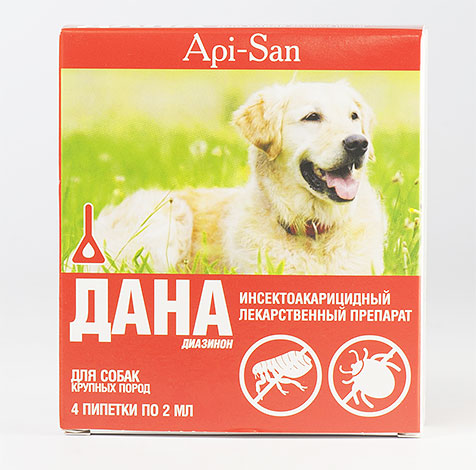
For the treatment of chicken coops, you can use almost any insecticidal means that are used to fight cockroaches, bedbugs and fleas in residential premises — concentrates and microencapsulated preparations like Get, Tsifoks, Kukaracha, Tetriks, Karbofos. Household insecticides in cans, for example, Raptor, Reid, Combat, for handling chicken coops are less convenient and on average less economical.
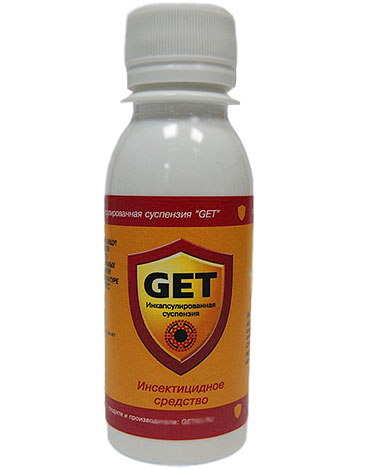
When processing chicken coops, it is necessary to take into account some specific features of both the fleas themselves and the premises being treated.
On a note
Preparations used to get rid of fleas of other domestic animals are well suited to owners of small poultry houses with up to 10–20 chickens. For processing more birds need to use special tools.
What if a lot of chickens?
For the treatment of industrial chicken coops and premises that contain several tens or hundreds of birds, the following preparations are commonly used:
- Butox - Deltamethrin Insecticide Based Agent.The drug is quite effective and allows you to fight with fleas, even with serious invasions. Its main advantage is the possibility of easy preparation of significant volumes of insecticidal solution. Butox is sold in 1 ml ampoules, and to remove fleas it is necessary to dissolve the contents of each ampoule in 4 liters of water. For application to the plumage birds usually use special sprayers. Butox can also treat the premises of poultry houses, from which all birds have been removed. The concentration of the agent in the treatment solution for the coop is used the same as for the application of the agent to the plumage of the bird.
- Another widely used drug is Deltamethrin Powder. 100 grams of this powder contains 50 mg of Deltamethrin itself and a special inert powder filler. The tool is simply sprayed on the plumage of the bird and rubbed into the skin. If you have a special powder sprayer, you can process large chicken coops without a bird. After that, it is important to maintain a room for a few hours, or better days without cleaning and settling, so that all the flea larvae can be poisoned with the agent.Before settling chickens in the room, you should change the litter in the cages or cages, remove litter, do wet cleaning and thoroughly ventilate the coop.
Important!
When processing chickens with Butox and powdered Deltamethrin, it is important to control that the product does not get into their respiratory tract or eyes. You can not handle chickens by simply spraying the means in the chicken coop - each bird should be processed separately.
Use powder Deltamethrin and Butoks should wear rubber gloves and a respirator.
We derive parasites birds correctly
In order to rid fleas of hens or decorative birds, it is necessary to treat each bird with anti-flea drops. To do this, a few drops of the product are dripped from the bottle onto the back of the head, which are then carefully rubbed into the skin. In the future, through the subcutaneous blood vessels, the agent will spread throughout the chicken’s body, and the fleas that suck its blood will die.
When applying powder Deltamethrin means is applied to the entire surface of the body of the bird, except for the head, and rubbed into the skin.
Important!
You can not eat eggs, demolished during the breeding of fleas in chickens.Insecticide penetrates with blood into the yolk of the eggs, and although it does not have a pronounced effect on the human body, it can lead to various side effects.
The hen house itself must be processed after the chickens have been treated and free from fleas. It is important not to clean or wash the chicken coop before processing - the trash carried on the compost heap contains a huge number of flea larvae that will calmly develop on the heap itself and over time infect the fleas by visiting the heap of sparrows, and when it is close to the coop - and simply “under its own power ". You need to get rid of fleas in the hen house.
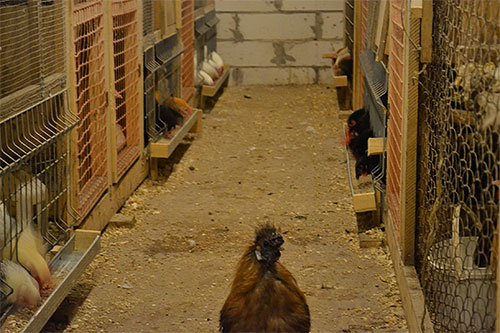
Treat the chicken coop from fleas should be completely, with perches (they are the maximum number of parasites), a layer of waste on the floor, feeders and nests. If there is too much rubbish on the floor, it can be loosened with a shovel or hoe and sprayed with the preparation separately.
Chicken from the chicken coop must be removed before processing. The preparation for fleas is diluted in the right concentration with water and sprayed on all surfaces in the chicken coop, after which it is left for several hours so that all parasites will be poisoned.After that, all the garbage is taken out of the coop, it is thoroughly cleaned and the floor is cleaned.
It does not always work to get the chicken fleas from the first time. For this reason, the treatment of the chicken coop should be repeated in two to three weeks, giving time to all the surviving pupae to turn into adult fleas — at the pupal stage, the parasites are least susceptible to insecticides.
How to protect a chicken coop from fleas?
Getting rid of chicken fleas is only part of the task. It is much more difficult to prevent them from breeding in the hen house. Here there is one reliable and proven in practice and time solution - to constantly maintain cleanliness in the room. In this case, even if the parasites penetrate into the chicken coop with new birds or flying sparrows, they will not reproduce here, since the larvae and pupae will be constantly removed from the room.
Measures and technologies for the permanent treatment of premises with insecticides have been developed only for industrial hen houses, and in private farms they are too labor-intensive and redundant. Therefore, it is much easier and safer for farmers to simply take out litter and litter from the hen house regularly, and pour fresh sawdust on the floor, instead of fighting with fleas in chickens with the help of chemistry.
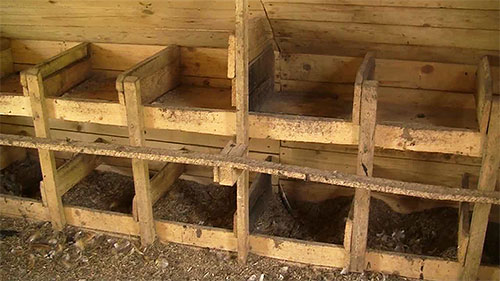
Additionally, you can protect your chickens from blood-sucking parasites by laying out brooms from fresh wormwood and tansy in the hen-house - the smells of these herbs scare many insects, including fleas. Thanks to such measures chickens will be more reliably protected by fleas.
Useful video about chicken diseases
Practical advice on the proper arrangement of the chicken coop

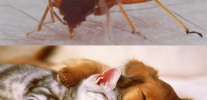
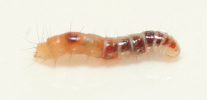
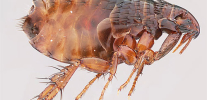
Remedy for chicken fleas -?